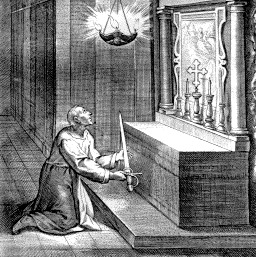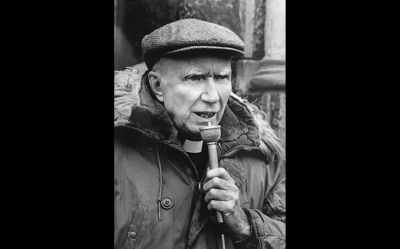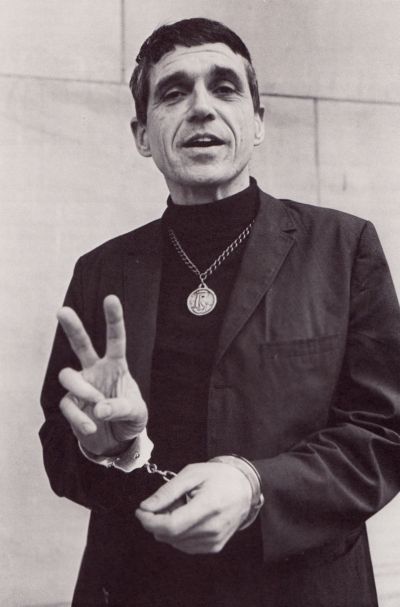A select history of Christians, Catholic Workers, Jesuits, Catholic Universities and U.S. military.
33 AD: Jesus of Nazareth teaches and give witness to a message of nonviolent love, even love of enemies. He is condemned to death by the Roman Empire for treason. His crime is placed on the Cross: “Jesus of Nazareth, King of Jews.” In the first several centuries of Christianity, after Jesus’s resurrection from the dead until late-fourth century, the followers of “The Way” refused to fight in the military. In some cases this resulted in martyrdom. “I cannot serve because I a Christian.” (St. Maximillian to the Roman counsel at his trial.) He was executed.

Surrenders Military Weapons1522: Ignatius of Loyola, a soldier, travels to monastery of Montserrat where “he begged and obtained leave of his confessor to give up his horse, and to hang up his sword and his dagger in the church, near the altar of the Blessed Virgin.” (Autobiography of St. Ignatius of Loyola) He continues on his journey to be a companion of Jesus and is founder of the Society of Jesus, Jesuits.
1917: Dorothy Day worked for The Masses, a radical newspaper that opposed conscription, the Selective Service Act of 1917 that authorized compulsory enlistment. The newspaper was shut down by US government and its staff charged with sedition: “unlawfully and willfully…obstruct the recruiting and enlistment of the United States military”…
1940–45: Dorothy Day and the Catholic Worker oppose the Selective Service and Training Act of 1940 and military action in World War II. Catholic Worker subscriptions drop drastically, a number of Catholic Worker Houses of Hospitality were closed and Dorothy and Catholic Workers face scorn for opposition to the war.
1946–2000: After World War II a survey conducted by the Department of Defense discovered that only one in four soldiers fired their weapons at the enemy. Over the years the Department of Defense instituted a new type of military training. “Modern combat training conditions soldiers to act reflexively to stimuli—such as fire commands, enemy contact, or the sudden appearance of a ‘target’—and this maximizes soldiers’ lethality, but it does so by bypassing their moral autonomy. Soldiers are conditioned to act without considering the moral repercussions of their actions; they are enabled to kill without making the conscious decision to do so.” With reflexive
killing, killing without conscience or reflection, now about 95% of soldiers fire weapon at the enemy. However, there has been major consequences on veterans experiencing Post Traumatic Stress Disorder. The suicide rate of veterans is now about 22 per day.
1948: In the April Catholic Worker newspaper Dorothy Day writes: “Some of us at the Catholic Worker have been going to the colleges and distributing a leaflet against Universal Military Training (UMT). And most everyone, to whom we gave the leaflet, has expressed acceptance of UMT and has thought it a good thing. There are no antiwar organizations in the colleges these days, at least not in the Catholic colleges. There is a sense of the inevitable, the war is to come, and that morality has nothing to do with it, that it is a question of licking Russia….”
1960–1979: Dorothy Day, co-founder of the Catholic Worker Movement refused to accept awards or honorary degrees from a Catholic University that hosted military training on campus. As she explained to Father Leo McLaughlin SJ of Fordham University in 1971: “I have had to refuse seven colleges and universities for the reason that they had ROTC and in one way or another were closely allied to the Federal Government.”

Father Richard McSorley S.J.1970: Georgetown students and faculty protest ROTC. Fr. Richard McSorley S.J. and Fr. Jerry Hall, S.J., joined in efforts that led to Georgetown discontinuing academic credit for ROTC courses. (They were restored three years later.) Father McSorley said “I am opposed to the destruction of life. I’m opposed to educators using the facilities to promote that.”
1973 −1996: After the end of the draft, the military looked to colleges and universities to train the majority of officers. In the 70’s and 80’s numerous universities refused to host military training on campus. The Department of Defense contracts select universities in each geographic area that were willing to host Department of Defense military departments.
1985:Father Ignacio Ellacuria S.J., Salvadoran Jesuit, in talking to Father John Dear about ROTC said: “Tell the Jesuits of Georgetown that they are committing mortal sin because they are supporting the forces of death which are killing our people.” Fr. Ignacio was killed by the US trained military in 1989.

Father Daniel
Berrigan S.J.1989: After teaching for a semester at Loyola University in New Orleans Father Daniel Berrigan, S.J. a Jesuit, wrote to the president that he wouldn’t be back due to his opposition to the Loyola’s ROTC program. The university president disagreed, replying that “given the reality of the military, it is better to have officers who have the benefit of a Jesuit education.” Berrigan wrote back: “I love your logic. It seems to be that, given the reality of abortion, Loyola should sponsor an institute for abortionists, and given the reality of capital punishment, you should sponsor an institute for executioners.” After Loyola ceased to be a Host University for the military, Dan Berrigan accepted an honorary degree from Loyola, New Orleans.
1996:Solomon Amendment is a federal law that allows the Secretary of Defense to deny federal funds (including research grants) to institutions of higher education if they prohibit or prevent ROTC or military recruitment on campus.” Host schools, willing to host Department of Defense military training, were established for each geographic area and the rest of colleges and universities sent ROTC, NROTC and AFROTC students to these host schools for military training. Credits for military training were transferred from the Host school to the feeder school. Today 17 Catholic Jesuit University Colleges and Universities are listed as Host schools with contracts with the US Department of Defense.